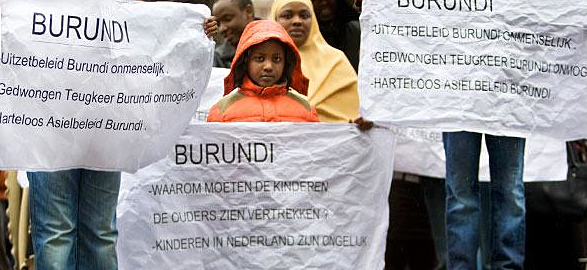An asylum seeking father’s suicide in Holland for the sake of his children has highlighted the growing local-national divide over the deportation of children.
On 9 April 2012, Alain Hatungimana, a 36-year-old Burundian facing deportation with his two children, took his own life in a desperate attempt to prevent his children’s removal. Fourteen-year-old Abdillah and 12-year-old Maimuna, who had arrived with their father five years ago, had already lost their mother in the civil war between Hutus and Tutsis. Friends said Hatungimana was depressed and fearful for his and his children’s future.[1]
It was the second suicide in Holland in four months: on 28 December, a mentally ill 41-year-old Sri Lankan asylum seeker killed himself at Schipol airport’s reception centre after his application to stay was refused.[2] Research by the Mental Health Department of the Association of Community Health Services reveals that 40 asylum seekers took their own lives between 2002 and 2010. Another 290 attempted suicide. The inhumanity of the long-drawn-out asylum process in the Netherlands, during which no work is permitted, frequently causes depression and anxiety to already traumatised people, according to a spokesman for the Burundian community in the Netherlands. Psychiatrist Kees Laban said that asylum seekers are difficult to treat because they have so few prospects. ‘Hope is very much tied up with things like being seen and heard and being part of society.’[3]
In the concern for his children’s future which apparently drove him, Hatungimana’s death echoes that of Manuel Bravo, an Angolan asylum seeker who hanged himself in the notorious Yarl’s Wood removal centre on the eve of his deportation in September 2005. Bravo, who had settled in Leeds where he attended the local church, was arrested for deportation with his 13-year-old son Antonio, for whom he left a note urging him to ‘be brave, work hard and do well at school’. In the aftermath of his death, a project was set up in Leeds, the Manuel Bravo project, to provide asylum seekers with free legal assistance, as Bravo had been forced to represent himself on his asylum appeal in 2002 for want of legal representation.[4]
Conflict over allowing children to stay
Hatungimana’s suicide also revealed the growing gulf between local and central government in their response to children of asylum seeking families. The Culemborg local authority, where the Hatungimanas lived, adopted a supportive attitude to the family; in August 2011 it had asked immigration minister Gerd Leers to exercise his discretion to allow the family to remain in the Netherlands, but its plea was rejected despite their integration into the community. Following the death, the local council has said it will ‘do everything possible to keep the children’ in the country, while teachers from the local school attended Mr Hatungimana’s funeral.
The local authority’s approach in the Hatungimana case mirrors that of over 145 local authorities, including those of the Netherlands’ biggest cities Amsterdam and Utrecht, which have supported a petition proposing that asylum seeking children are allowed to stay in the country after eight years in the process (five years for children in the Netherlands without parents or relatives).[5] The petition, launched by Green Left MP Tofik Dibi in December and signed by around 120,000 people by March 2012, follows a Bill introduced in October 2011 by the Labour Party and the Christian Union. The Bill was doomed to fail through the opposition of Geert Wilders’ far-right Freedom Party and the Council of State’s denunciation of it as ‘unfair’ in February 2012.[6]
A number of controversial deportation decisions led to the Bill and the support for the petition among local authorities. They included Saher, the 14-year-old Afghan girl who had spent ten years in the asylum process, spoke perfect Dutch and had become a strong supporter of the Dutch national football team, and Mauro Manuel, the 18-year-old Angolan boy who arrived as an unaccompanied asylum seeker when he was 10. After widespread publicity and anger at the proposed deportation both teenagers received last-minute reprieves.
Stand-off
But the row between central and local government goes further than the treatment of children. Increasingly, local authorities are looking askance at central government’s tough stance on undocumented migrants and refused asylum seekers. Local authorities reacted with anger to the immigration minister’s decision to impose a quota on police to encourage them to round up more undocumented migrants, and in March the mayors of 17 cities expressed their unwillingness to cooperate with the quota, set at 4,800 for the year.[7] At the beginning of April, around 40 mayors, representing the areas where reception and removal centres are located, wrote to the immigration minister saying they would not cooperate with deportations if there was a risk to public order. When minister Gerd Leers said that police must follow his orders, they responded that the police are answerable to local authorities, not to the immigration minister.[8]
‘Municipalities, organisations and citizens are raising the alarm about asylum policies more and more often’, said Sharon Gesthuizen (Socialist Party MP). Together with Christian Union MP Joel Voordwind, she believes that minister Leers should listen far more to the mayors when it comes to deciding whether or not deportation should take place.
The collapse of the Dutch government as the Freedom Party withdrew its support for the minority administration in April perhaps gives these local authorities a chance to lead public opinion in stopping deportations. They will need all their courage, as Wilders’ Freedom Party cranks up the xenophobic, anti-immigration and anti-Muslim rhetoric for the September elections.
Related links
Read the IRR’s Briefing Paper no. 4 on Accelerated removals: a study of the human cost of EU deportation policies, 2009-2010


The glimmer of light and hope in this tragic story must be the resistance of local government, bolstered by individuals (122,000 to date)to challenge the rhetoric and actions of racists